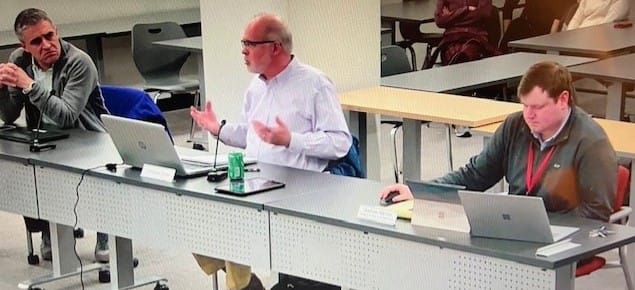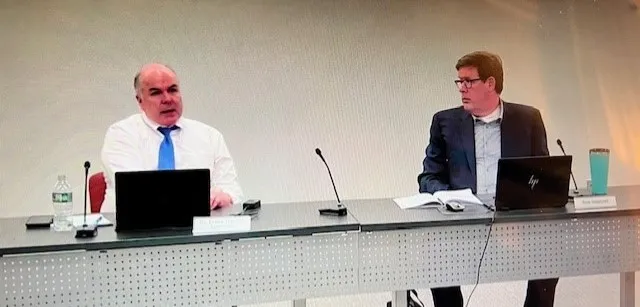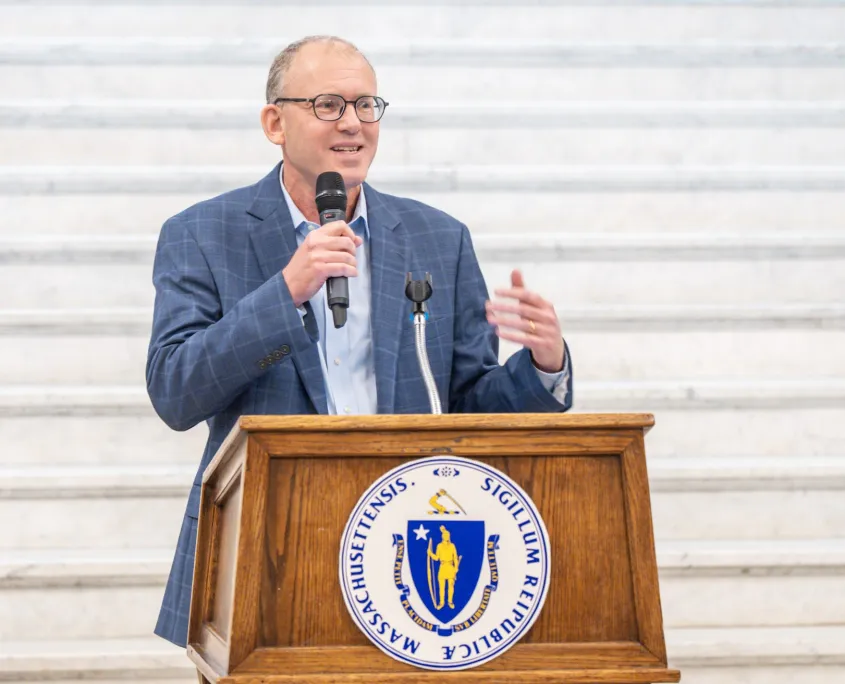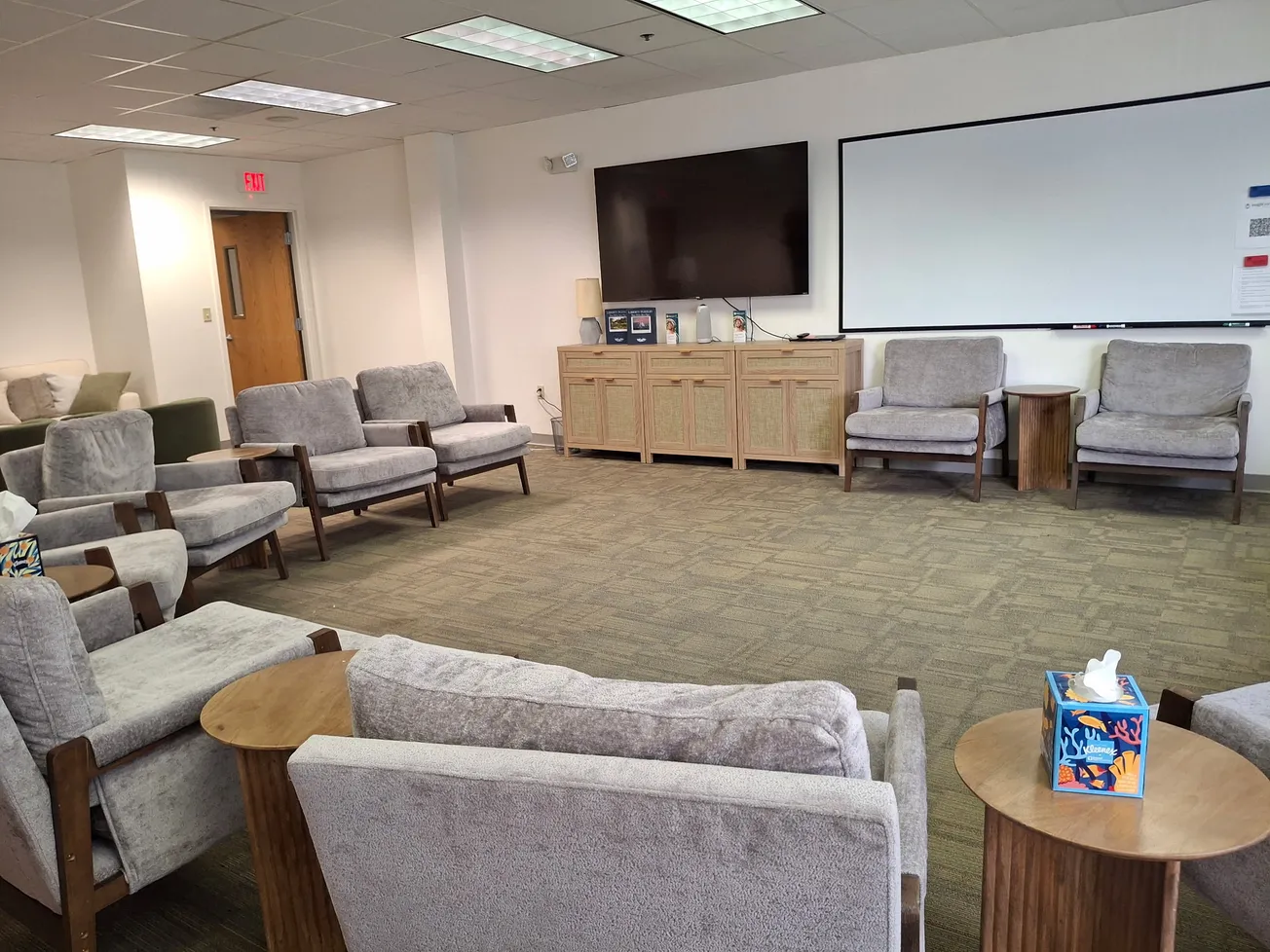Table of Contents
After the previous meeting on Feb. 13 was canceled due to bad weather, Superintendent Dr. Frank Hackett on Feb. 27 updated the School Committee on the process of evaluating the elementary literacy curriculum.
However, Hackett did not present the details many had been waiting for, leading to a contentious discussion among members of the committee.
After parents in attendance again gave strongly worded statements during public comment, pressing the School Department to abandon the controversial Lucy Calkins Units of Study curriculum, Hackett began his presentation.
Although he had promised at several prior meetings to give an overview of how literacy is taught in Winchester schools and what curricula and methods teachers are using currently, Hackett instead informed those present that he had changed his mind, fearing it would make the School Department look “defensive.”
Audible groans could be heard in the room in response to this.
“I’m concerned that having that presentation, and talking about that, might be perceived as us not being open-minded [or] willing to listen to the entire discussion through this process,” he added, “I know that there are some here tonight expecting that presentation and I apologize that that’s not what tonight is for me.”
Instead, Hackett said he would “just give an overview, an update on where we are with entering into this evaluation.”
The superintendent had also been scheduled to have an in-person all-staff meeting on Feb. 13 to talk with teachers, but that meeting had similarly been canceled due to weather. He indicated it will now most likely not take place until March 12, with some possible Zoom meetings in the interim to gather feedback.
Hackett said that he had “spent a lot of time listening through the month of February,” attending “all but [Vinson Owen] and Lynch parent associations at this point,” and that the School Department had “engaged with the Collaborative for Educational Services (CES) in western Massachusetts” to perform the upcoming evaluation.
A slide presented at the meeting listed CES as a “public nonprofit, 501(c)(3) educational services agency.”
Hackett said the lead researcher on the project “is not a literacy expert.”
“It was important that we didn’t have a literacy expert doing the research design [because] we’re trying to gather information and feedback and input on where people are,” Hackett said.
The design team will also be made up of Winchester parents and teachers, with a goal of having every elementary school represented.
The evaluation process
According to slides presented during last week’s meeting, the evaluation will focus on “the WPS literacy program as it relates to tier 1 instruction (general classroom literacy curricula and teaching) and tier 2 instruction (interventions for struggling learners). This is not an evaluation of the WPS literacy special education program.”
The superintendent said that in the coming months (March through May), surveys will be sent directly from the collaborative to teachers as well as parents and caregivers, with responses collected anonymously, and listening sessions will be held with the two stakeholder groups.
After the data is gathered and sorted by CES, there will be a final presentation of the findings in May or June, with interim updates provided along the way.

“I know this may not be where people want us to be in terms of a process, but if we were going to do any kind of curriculum work, in any content area, this piece that we’re doing now is really the critical first step,” Hackett said of the decision to not simply drop the Units of Study curriculum. “It’s mapping out where we are and hearing what the taught curriculum is, what happens when teachers go into the classroom.
“We know the resources we have but how are [teachers] using them, what do their literacy blocks look like, how do they feel about the materials they’re using?” he added. “Those questions are a critical part of mapping out and understanding our current state.”
Hackett also gave a summary of steps taken over the last few years to address earlier parent concerns about Winchester’s literacy program.
Evaluation of learning program
Prior to Hackett’s arrival in Winchester, the School Department performed an evaluation of the language-based learning program for kindergarten through 12th grade, which was completed at the end of January 2022.
One of the recommendations that resulted was to hire a special education supervisor. The department posted the position last summer, and Hackett indicated the town may be close to hiring someone to start July 1.
Hackett went on to list several other steps the School Department had taken since the evaluation. Those include purchasing and piloting the Heggerty phonemic awareness program in 2021; piloting the UFLI Phonemic Awareness curriculum in 2022, and introducing it more broadly this year; and in June 2021 selecting the DIBELS 8th Edition, which is a screening tool for reading fluency.
In addition, the Massachusetts Department of Elementary and Secondary Education (DESE) released guidelines for dyslexia screening in April 2021, and the approved universal screener list in 2022, but did not specific guidance until June 2023, so that “has been a slow roll-out” according to Hackett.
School Committee questions
Following his presentation, Hackett took questions from School Committee members.
Shamus Brady asked whether UFLI is now available to all teachers in all schools for grades K-2, to which Hackett answered yes.
Next, Chris Nixon expressed concern about comments he had heard recently related to the literacy discussion.
“I was really troubled when I hear parents or the community use words like ‘retribution,’ that somebody feels they can’t say something because they fear retribution,” Nixon said. “We don’t send people out to the schools to break kneecaps, so I don’t know what that means. I’m hoping that’s not real, I hope it’s not pervasive.”
He backed the superintendent’s plan for the upcoming evaluation.
“I think you’ve mapped out a really solid process and I support it,” Nixon said.
Nixon said he had recently re-read the findings in the language-based learning report from 2022, and shared some of them, seeming to push back against the notion that most teachers feel like there needs to be a change in the literacy curriculum, and pointing out a disconnect between what teachers and parents perceive.
“Eighty percent of the teachers surveyed felt they always or most of the time had access to the materials they needed to teach reading and writing; the other 20% said sometimes,” he said, “but what’s so fascinating to me is that the same question went to parents [and] 10% of parents said they felt like teachers had this access to the materials they needed always or [most] of the time; 25% said sometimes; 30% said never.
“Both can’t be true, so what’s true?” Nixon continued. “A teacher said ‘Where we need the most support from the administration is in dealing with the demands and requests from families. One thing that needs to change is better communication with parents from administrators.’
“‘It feels like our professional judgement is called into question more and more often, even when the data supports our finds or our ideas,” Nixon continued, reading another teacher statement. “‘It feels like we’re doing more and more to appease families even if it’s not what we believe is in the best interest of the student.’”
Nixon said he feels frustration coming from both teachers and parents, that there has been a disconnect for some time and that the proposed process needs to happen to give everyone a chance to be heard and give their input.
Chair Tom Hopcroft agreed there has been “a breakdown in trust in the community” and this proposal will help by being a “collaborative effort” among educators and parents, facilitated by a neutral third party, “an approach that in many ways is blind, but really lets us get to the substance of ‘what is the current state?’”
Hopcroft urged everyone to be open and forthcoming with their experiences “because if the output of this is a significant change, it’s going to require significant investment, and we need to show that we’ve had a very thoughtful process to get there.”
Concerns over curriculum
After Nixon and Hopcroft both voiced their support for the superintendent’s approach, Brady weighed in with skepticism about Hackett’s decision not to give his promised update.
“I’m a little surprised that we didn’t have our presentation tonight... I understand the rationale, but I definitely would have liked to have a fuller picture of what’s going on in the different schools, what curriculum is being used, what that looks like, how consistent is it?” Brady said. “I don’t think that would interfere with our process if we talked about what we do now. I think that might help some folks understand what we’re doing.”
Brady said he had his “own concerns with the Units of Study curriculum” and how long the town had been using it, adding “there’s a reason that schools don’t keep their curriculums for 10 or 15 years because they need to adjust and the times change, and they need to get new materials that are updated, that have new research, new science behind them, new techniques.”
Brady concluded, “I appreciate that we’ve brought on the UFLI, and I appreciate our staff who made that happen.”
He then made a motion that, “we as a committee commit to replacing the Units of Study curriculum, as soon as possible, knowing that we can’t commit to replacing it next week or next month [because] the funding is a piece that we would need. But I do think we need to make a commitment to move on from it... as soon as possible.”
Responding to a question from Nixon, Brady clarified, “’to move on from’ would mean to purchase a different curriculum and implement a different curriculum in our elementary schools.”
“I think you just undermined the entire process that Dr. Hackett set up,” said member Michelle Bergstrom, pointedly. “I’m not even clear that we still use Units of Study in our classrooms, how extensively, to what degree.”
Brady responded, “I’m not either and I was hoping to find that out tonight... I would disagree that we probably don’t have a good sense of how often Units of Study is used and to what extent it is used in the classrooms.”
Bergstrom replied, “What I’m hearing from parents in the community is that teachers are using things that we’re not aware of, that teachers feel like they can’t use things they want to use. That would indicate to me that maybe teachers aren’t necessarily using Units of Study in the classroom today, and I think that if we’re going to build trust with parents and teachers that we need to go through the process where we find out what is being used in our classrooms today.”
Brady responded, “And I still think we can commit to putting a new curriculum in place, whatever that curriculum may be.”
Nixon interjected with, “I think we will get there... I feel like it’s a stronger statement if we can [say what curriculum we want to pivot to, and outline the reasons why and what it will cost].”
Hackett worried that, “there could be some unintended consequences of making a decision on the front end of this process, before we go through it. I could imagine there may be some teachers and literacy people watching [for whom] that comment or action might be very unsettling.”
Hackett said he had been “concerned about presenting to the committee and the public what we’re doing in literacy, [only] to find out [during the evaluation] there’s a wide variety of what we’re doing in literacy that we’re not even really aware of. I think that like any school system in any content area, there’s the stated curriculum and there’s the taught curriculum.”
Compounding the murkiness is the fact that the district has hired 14 new teachers at the elementary level in the past three years, which is “fairly impactful.”
Bergstrom also expressed concern about the committee taking a stand against Units of Study, for fear that teachers who are using it might be afraid to admit it.
“I disagree,” Brady said. “I don’t think teachers would be hesitant to tell us what they’re using. I think we should move on from Units of Study; we’ve been using it for an extended period of time.”
Bergstrom repeated it was impossible to know what exactly was being used in any classroom without going through the proposed evaluation process, and when further pressed by Brady to say whether she supports keeping Units of Study, she answered, “I am not going to take a position on Units of Study, for or against it, right now, before we go through this process.”
Without a second to his first motion, Brady made another motion “that the School Committee commit to piloting at least two new literacy curriculums next year,” reasoning that, “if we could commit to do that, it would show good faith effort on our part.” This motion also failed, with nobody seconding the motion.
In the end, the School Committee voted unanimously in favor of a third motion, made by Nixon, “that we include elementary literacy evaluation as a standing agenda item for the next three or four months.”
Winchester News is supported by our community. Please donate to support our work.









